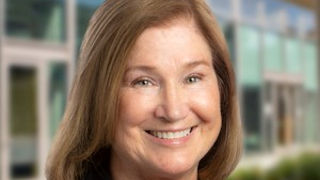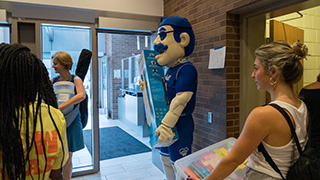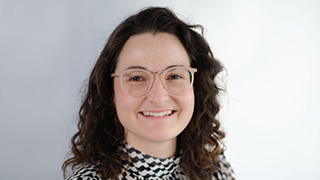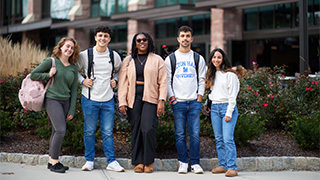Distinguished Researcher and Clinical Psychologist Barbara Mason Delivers Keynote Address at 14th Annual Biological Sciences Symposium
Monday, April 11, 2022

Professor Barbara Mason, Ph.D.
Professor Barbara Mason, Ph.D., of the Scripps Research Institute, will deliver the keynote address, "Current Status and Innovative Strategies for Medications to Treat Alcohol Use Disorder," at the 14th Annual Biological Sciences Symposium at 5:25 p.m. on Thursday, April 28, McNulty Hall Lerner Amphitheater SC-101.
The biosymposium seminar, part of the Matthew Petersheim Academic Exposition 2022: Observe, Explore, Achieve, is hosted by the Department of Biological Sciences from 3 p.m. to 6:30 p.m. and includes opening remarks by Heping Zhou, Ph.D., chair, Department of Biological Sciences, followed by graduate and undergraduate student presentations. There will also be remarks from Edward Tall, Ph.D., Biosymposium committee chair and senior faculty associate of Biological Sciences.
Mason serves as director of the laboratory of Clinical Psychopharmacology and director of Pearson Center for Alcoholism and Addiction Research, in the Department of Molecular Science, Scripps Research Institute, La Jolla, CA. Her seminal research has been described as "a landmark work of major public health significance."
Since receiving her Ph.D. in Clinical Psychology at Long Island University in 1983, followed by a post-doctoral fellowship in neuropsychopharmacology at Weill Cornell University Medical College, Mason has focused on researching potential medications to enhance the prolonged recovery and relapse prevention in alcohol use disorder as well as nicotine and cannabis addiction. She has also held many academic positions at various postsecondary institutions throughout the United States. These include Long Island University (1981-1984), Weill Cornell University Medical College (1981-1991), University of Miami (1991-2000), The Rockefeller University (1992-2003) and Scripps Research Institute since 2003. She has also served as a member of various organizations involved with drug research including the National Institute on Alcohol Abuse and Alcoholism (1993-2002), the National Institute of Health (2000-2014) and the National Institute on Drug Abuse (2012-2018).
Mason has served as the Pearson Family Chair of the Department of Neuroscience and director of Pearson Center for Alcoholism and Addiction Research at Scripps Research Institute. The Pearson Center for Alcoholism and Addiction Research was established in 2003 in the pursuit of utilizing the latest biomedical technology to investigate and develop new clinical treatments to fight alcohol and drug addiction. Unlike many other treatment efforts, this facility focuses on the physiological changes brought on by addiction, especially those that lead to disease and relapse. Since its inception, the center has—and continues—to develop groundbreaking therapies for addiction through clinical trials.
Along with this, Mason serves as director of Clinical Psychopharmacology at Scripps Research Institute since 2006. During this time, she has overseen numerous research projects evaluating the potential medications for drug and alcohol abstinence as well as relapse prevention. Recently, she served as the principal investigator for an FDA-approved study of acamprosate for treatment of alcohol dependence. She has also worked on various research projects focusing on medicinal treatments for alcohol addiction. This includes a study entitled "Glucocorticoid receptor antagonism as a pharmacological target for the treatment of AUD (alcohol use disorder)." This study focuses on the use oral mifepristone for AUD through the targeting of glucocorticoid receptor as an antagonist. She also led another study that focuses on the use of oral gabapentin, an indirect GABA-modulator as a treatment for AUD. These studies have led to future studies regarding these therapies with the goal of eventual approval of these treatments worldwide.
Mason's studies have led to more than 120 publications and many prestigious accolades. These awards include the Smithers Distinguished Scientist Award from the American Society of Medicine (2017), an elected fellow in the American College of Neuropsychopharmacology (2005), MERIT award for Medication Development from the National Institutes of Health (2003), and Dean's Senior Clinical Research Award (1999-2000). She has also given a variety of presentations at professional events such as "Human Lab Study of Apremilast for AUD and Future Directions" for the Satellite Meeting at Research Society on Alcoholism (RSA) 42nd Annual Scientific Meeting (2019) and "Translational Science of Alcoholism: The Devil is in the Details" for the UCLA Luskin Thought Leadership Meeting on Translational Science of Alcoholism.
This year's biosymposium is open to all – students, faculty, staff, alumni, and the public interested in discussing the research projects conducted by those in the Department of Biological Sciences. Participants include both undergraduate and graduate students, who will present on a wide range of topics related to biology. Those interested in the poster session are asked to wear masks. For any questions pertaining to this event, please contact organizer Edward Tall, Ph.D., at [email protected] or Sulie Lin Chang, Ph.D., president, Society on NeuroImmune Pharmacology; director, Institute of Neuroimmune Pharmacology; and professor, Biological Sciences at [email protected].
Categories: Arts and Culture





